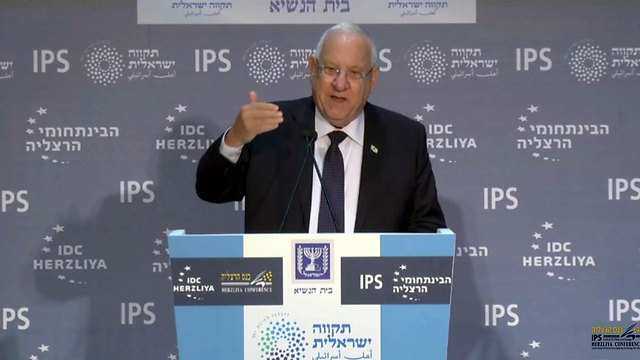The president warned that excluding Haredim and Arabs from the workforce is bearing negative financial effects; he also highlighted the role the civil and public services and academia can play in advancing equality
At the beginning of the 16th Herzliya Conference, President Reuven Rivlin alluded to his “Four Tribes” address that he delivered from the same lectern last year, wherein he spoke about the fissures in Israeli society. He said, “Academia and the workforce today are suitable for two tribes (the religious and secular), but there are two other tribes—the Haredim and Arabs—who have remained behind.” Rivlin warned that excluding the two other tribes is leading to an economic downfall.
Rivlin highlighted the forces of change that he believes can bring hope to Israel: “The first such (force) is that of public and civil service—particularly in government offices. This is a system which has the role and the power to ensure essential equality between the citizens of Israel, from all the sectors, and to strengthen their faith in the state’s institutions.”
He then argued that the second force of change lies within academia: “If in the past the IDF was the main meeting place of Israeli society, in the new Israeli agenda, whether we like it or not, academia has become the first place in which Israeli society meets itself and one another. Academia and the labor market are the gates to fulfilling the Israeli dream. They are our admission ticket to the centers of influence in the economy, wherein was first created a common space to forge a common language and goals, where the sense of belonging and social status is formed.

“Let’s not fool ourselves—the change of the elites takes a toll, as by nature the elite want to perpetuate their status. The change will come only when the professional environment will become sensitive and responsive to all the sectors that operate within it, and recognize its responsibility to create a meeting which is positive and significant for all those arriving at its gates. This change in the academic sphere and the labor market is not only a moral imperative for the youth of this country and our image as a society, it is also an economic necessity. Making the most of Israeli personnel and talent, In particular from ultra-Orthodox and Arab communities, is the most important engine for growth at our disposal, and keeps us from a predetermined path of economic collapse.”
Following his speech, Rivlin addressed a question about Israeli identity in 2016, referencing a meeting he had with a young Arab girl who brought up the Israeli national anthem’s line, “As long as a Jewish soul yearns”: “Around two weeks ago, I visited a religious Jewish high school in Jerusalem. I participated in a meeting there between the religious, secular, and Arab students. In the meeting, one Arab student said to me, ‘I am a citizen of the State of Israel, and I want to identify with the state in which I live, but between the flag, and the festivals, and the anthem which I respect, what can I do, ‘my soul yearns’, but it is not Jewish.
“‘I just want to understand from you, Mr. President, what is my place?” This is what she asked me. Personally, I am moved each time I see the Israeli flag raised, and at the same time, I understood and was pained by her question. And she is not alone. Not all the Jews sing the national anthem, there are Jews who are not Zionists—do they have no right to be Israeli? Is anyone who deals with the issue of Israeli identity a post-Zionist?
“It is evident from the briefest of looks at the city of Jerusalem—the largest Arab city in the country, the largest ultra-Orthodox city in the country, the largest Modern Orthodox city in the country, and the second largest secular city in the country; the city so beloved, but also so poor, torn, and strained – that market forces alone, and exchanges of good-will alone, between individuals and organizations as moral as they may be, cannot deal with such a great challenge.”
As reported by Ynetnews
